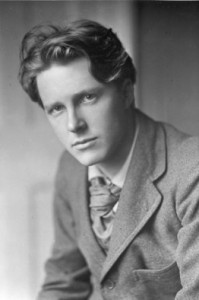The Wall Street Journal: Literature: The Tragic Poets of World War I
In the early 1940s, the English man of letters Robert Graves observed that patriotic verse had always been written in time of war—but only in World War I did the terms “war poet” and “war poetry” come into use, and both were “peculiar to it.” The soldiers in the trenches included enormous numbers of highly educated young men from nonmilitary backgrounds, who brought a new and different sensibility to the experience of war.
The first notable war poet to emerge was the young Rupert Brooke. His 1915 poem “The Soldier” captured the early spirit of duty and sacrifice: “If I should die, think only this of me; / That there’s some corner of a foreign field / That is for ever England.”
But the Brooke model was short-lived. Later poets challenged the idea that patriotism had any connection with such slaughter. Two in particular, Wilfred Owen (“Dulce et Decorum Est”) and Siegfried Sassoon (“How to Die”), came to symbolize the disillusionment of an entire generation. Where Sassoon was sarcastic, Owen was blunt, as in “Anthem for Doomed Youth”: “What passing-bells for these who die as cattle? / Only the monstrous anger of the guns. / Only the stuttering rifles’ rapid rattle.”
But the war poets’ greatest contribution wasn’t their rediscovery that war is truest hell but their reinvention of poetry as a democratic mode of expression. The poems of Ivor Gurney,Wilfrid Wilson Gibson, Herbert Read and others became part of the Western historical vernacular. Later, the canon was broadened to include such novels as Ernest Hemingway’s “A Farewell to Arms” and Erich Maria Remarque’s”All Quiet on the Western Front.”
But the war’s literary impact was deepest in Britain, where generations continue to find truth and inspiration in World War I poetry—from Joan Littlewood’s 1963 dark musical “Oh, What a Lovely War” to Pat Barker’s haunting novels (including “Regeneration” and the Booker Prize-winning “The Ghost Road”) in the 1990s. Indeed, there is no other war in history, with the exception of the Trojan War, whose poetry has so shaped a nation.

